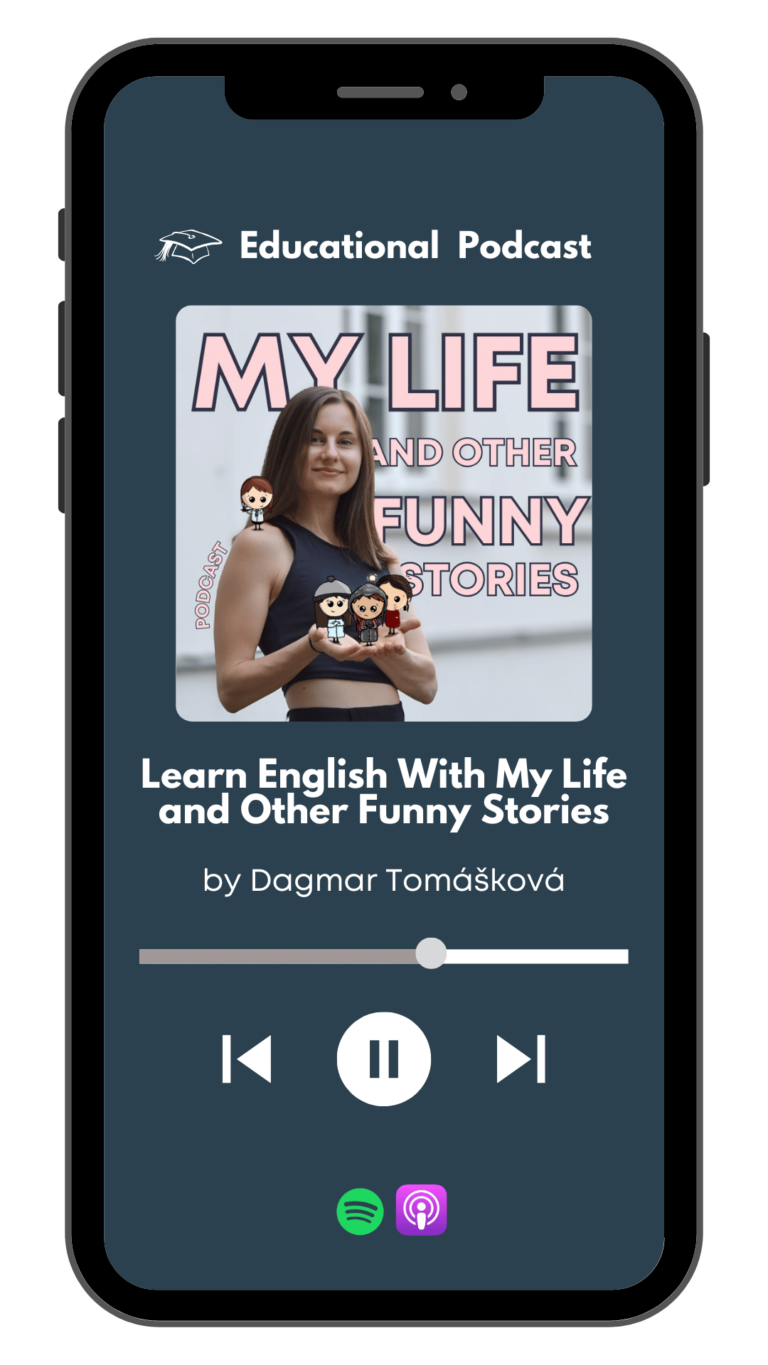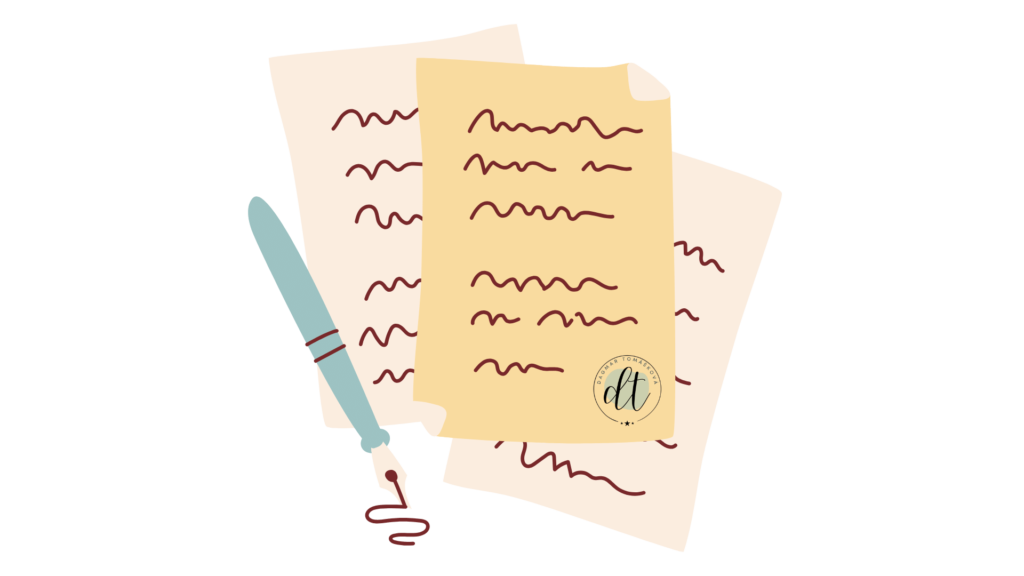
Ep.99: How To Sound More Natural In English (Immediately!)
Now … this is actually a very special episode, because it’s number ninety-nine. And you know the saying, “I’ve got 99 problems but sounding natural in English ain’t one”? That’s exactly what we’re talking about today – how to sound more natural in English.

LISTEN TO THE EPISODE HERE:
soon <3

Pokud chceš tento podcast a mou tvorbu podpořit, teď můžeš tady!

WRITTEN TRANSCRIPTION OF THE PODCAST
Hello and welcome to my podcast My Life and Other Funny Stories. My name is Dagmar Tomášková, I am an English tutor and coach and I created this podcast for English students who want to improve their oral comprehension. As always, you can find the transcription of this episode and the vocabulary list in the notes of the podcast.
Now … this is actually a very special episode, because it’s number ninety-nine. And you know the saying, “I’ve got 99 problems but sounding natural in English ain’t one”? That’s exactly what we’re talking about today – how to sound more natural in English.
So let me start with a little story. A few years ago, when I was in France, I was hanging out with my American friend Audrey, if you listen to my podcast regularly, you know her already. We were chatting, laughing and just spending time together, and suddenly she said: “Yeah, I mean, we are both American so..” and I responded: “Hey, I am Czech, I am not American, girl” and she said: “Omg, that’s right, I completely forgot.”
And I have to admit, I took that as one of the best compliments ever. Because sounding natural in English is not just about having perfect grammar – it’s about rhythm, intonation, word choice, and those little things we often don’t pay attention to.
So today, I want to give you a few practical tips and concrete examples that you can use to make your English sound more natural – starting right now.
Tip number one: contractions. Native speakers almost never say I am going, I will do it, I have not seen it. Instead, they contract. I’m gonna do something. I’ll do it. I haven’t seen it, I gotta go. If you want to sound natural, start using contractions everywhere. Try saying: I gotta go but I’m gonna call you tomorrow. instead of I have to go but I am going to call you tomorrow. It’s such a small change, but it instantly makes you sound more .
Tip number two: fillers and hesitation words. In Czech, we often say eee or prostě or jakoby. In English, the equivalents are you know, like, well, actually. For example: Well, I was gonna call you, but then I forgot. Or: It was, like, the funniest movie I’ve ever seen. These little words don’t carry a lot of meaning, but they make your speech flow more naturally. Just be careful not to overuse them. Because then it becomes a little annoying. Especially the word “like”. If you speak in this way: I am like so happy that I like when to the store that was like so great – it also doesn’t sound the best.
Tip number three: sentence stress and intonation. Of course, pronunciation is important but stress and intonation are important just as well. Czech is a very flat language, we don’t use such a wide range of pitch. English, on the other hand, is full of ups and downs. Try saying: I didn’t say she stole the money. Depending on which word you stress, the meaning completely changes. I didn’t SAY she stole the money – maybe I wrote it. I didn’t say SHE stole the money – maybe it was someone else. I didne say she STOLE the money. – I said that maybe she borrowed it. Playing with stress like this makes your English sound alive. Also stress of words is super-important. In Czech, every word is stressed on the first syllable. But in English, it is not like that. For example, we don’t say BAnana but baNana. Now, I will show you a few words that are very often stressed in a wrong way by Czech people and how to say them correctly. You can even repeat after me:
- Event – eVENT
- Hotel – hoTEL
- MIstake – misTAKE
- Understand – underSTAND
- Apartment – aPARTment
- IMportant – imPORTant
and so on, these little things will make a huuuge difference.
Tip number four: phrasal verbs. Instead of always using formal words, try to use more everyday ones. Instead of continue, say keep on. Instead of arrive, say show up. Instead of discover, say find out. For example: I found out she was lying sounds much more natural than I discovered she was lying.
If you struggle with phrasal verbs, very soon I will publish my new e-book with more than 260 phrasal verbs that you need to know at a B2 level, not only for conversation but also if you are planning to master the Cambridge B2 level exam. If you know these phrasal verbs, you are good to go. But it is not a boring list, those are everywhere. The phrasal verbs are divided into colorful mind maps with definitions, example sentences, and pictures, so it is easier to remember. I also created an interactive version of the whole e-book with Czech translations that you get as a bonus and also a guide and recommendations on how to approach this vocabulary in an effective way. It is the ultimate guide to phrasal verbs – so get ready for that!
And finally, tip number five: idiomatic expressions. Don’t be afraid to sprinkle them into your English. Things like: It’s not a big deal, I’m broke, That movie blew me away, I’m just chilling. These are the expressions native speakers use all the time, and once you start using them, people will instantly feel like your English is more authentic.
Okay, now let’s have a little fun and talk about how people can tell you’re Czech – because yes, there are some classic pronunciation giveaways. One of the biggest ones is how we pronounce words starting with “AU”. . For example: August. A Czech might say AU-gust. But in English, it’s AW-gust. Here is a short list of words that are very often mispronounced:
- author
- audience
- authentic
- autumn
- automatic
So careful with that.
Another giveaway: the “th” sound. We love to say it as d or t. So instead of think, a Czech person might say tink. Instead of this, they might say dis. It’s one of the hardest sounds for us, but also one of the most important if you want to sound natural. My advice: stick your tongue gently between your teeth and blow out air. It feels silly at first, but it works.
And one more: intonation at the end of sentences. Czechs often sound a little bit “flat,” like every sentence is just going straight ahead. But English uses rising intonation for questions and falling intonation for statements. Compare: You’re coming tonight. (flat, Czech style) versus You’re coming tonight? (rising, English style). Same words, completely different feel.
So, to recap – if you want to sound more natural in English, work on contractions, fillers, intonation, phrasal verbs, and idiomatic expressions. And pay attention to those little Czech giveaways in your pronunciation – the “au,” the “th,” and the flat melody of your sentences.
Thank you so much for listening to this 99th episode. I hope these tips help you feel a little more confident.
If you liked this episode, please leave a five-star rating and share it with your friends. Don’t forget, you can find the transcript and vocabulary list in the notes of the podcast. See you next time. Bye bye

VOCABULARY LIST
concrete examples – konkrétní příklady
contractions – zkrácené tvary (I’m, I’ll, haven’t…)
fillers – vycpávky (like, you know…)
hesitation words – slova vyjadřující váhání
fluency – plynulost
sentence stress – důraz ve větě
pitch – tón hlasu
master – zvládnout, ovládnout
authentic – autentický, přirozený
pronunciation giveaways – odhalující znaky výslovnosti
mispronounced – špatně vyslovený
stick your tongue gently between your teeth – jemně vložit jazyk mezi zuby
rising intonation – stoupající intonace
falling intonation – klesající intonace
flat melody – monotónní intonace
to recap – shrnout, zopakovat